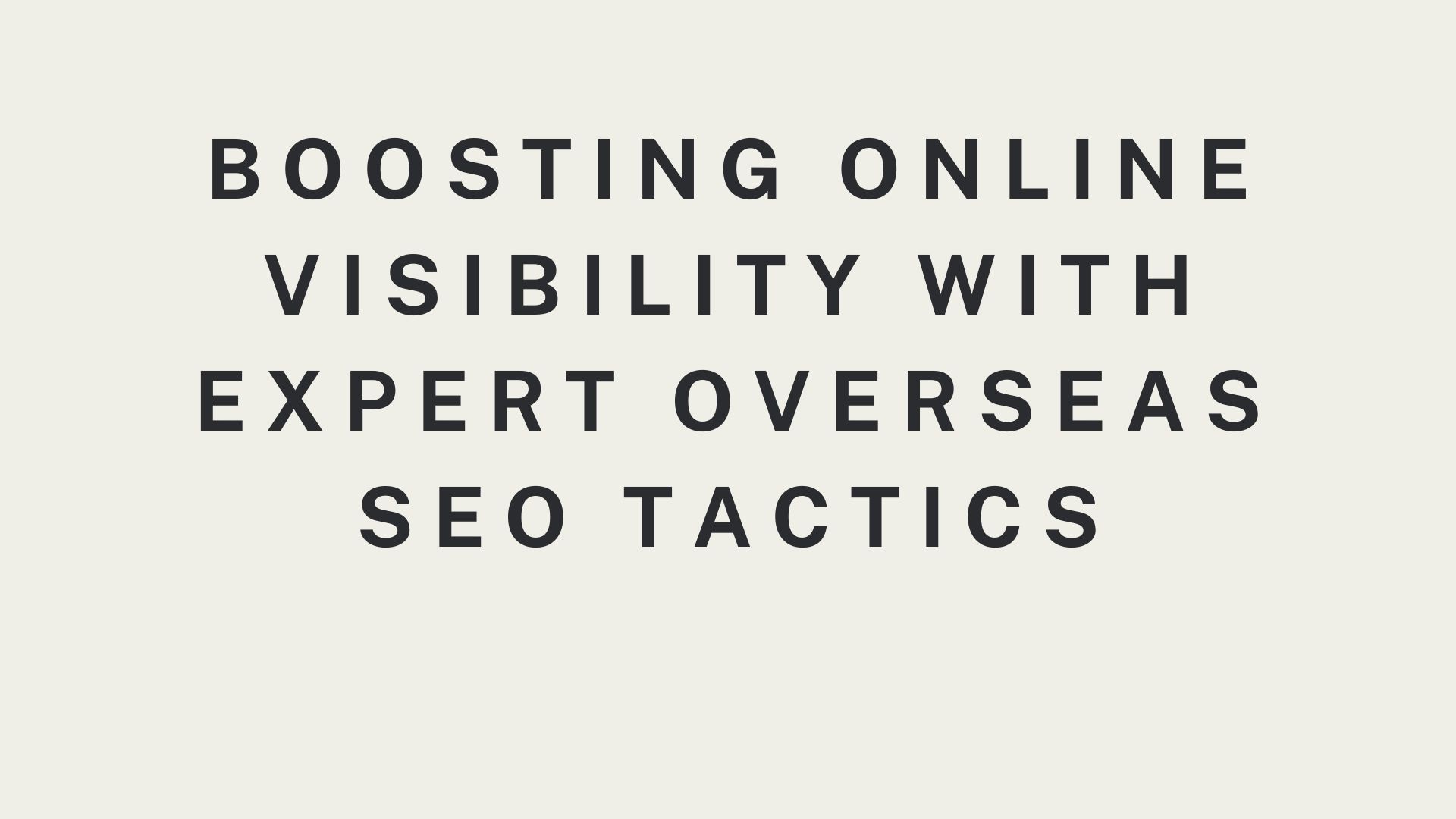In today’s digital world, having a strong online presence is vital for any business. It’s no longer enough to have a great product or service; you must ensure that people can find you online. One effective way to do this is by leveraging expert overseas SEO tactics. These strategies help businesses tap into global markets, drive more traffic to their websites, and boost overall online visibility. In this article, we will explore various overseas SEO tactics that can help your business thrive in the competitive digital landscape.
Understanding Overseas SEO
What Is Overseas SEO?
Overseas SEO, also known as international SEO, involves optimizing your website to rank well in search engines in different countries. This approach is essential for businesses looking to expand their reach beyond their home country. Unlike traditional SEO, which focuses on optimizing for a single country or language, overseas SEO considers the nuances of various languages, cultures, and search engine preferences across different regions.
Why Is Overseas SEO Important?
Expanding your business globally presents new opportunities, but it also comes with challenges. One of the biggest hurdles is ensuring that your website is visible to your target audience in different countries. Overseas SEO helps you overcome these challenges by:
- Reaching a Wider Audience: By optimizing your website for international search engines, you can attract visitors from various countries, increasing your potential customer base.
- Boosting Brand Recognition: As your website ranks higher in search results across different regions, your brand becomes more recognizable globally.
- Staying Competitive: In a global market, your competitors are likely already using overseas SEO tactics. To stay ahead, you need to implement these strategies as well.
Key Components of Overseas SEO
1. Language and Localization
Why Language Matters
When targeting international markets, it’s crucial to communicate with your audience in their native language. Not only does this improve user experience, but it also increases your chances of ranking well in local search engines.
Localization vs. Translation
Localization goes beyond simple translation. It involves adapting your content to fit the cultural, linguistic, and regional nuances of the target market. For example, certain phrases or idioms may be common in one country but unfamiliar in another. Localization ensures that your content resonates with the local audience.
2. Choosing the Right Domain Structure
Country Code Top-Level Domains (ccTLDs)
Using country-specific domain extensions (e.g., .uk for the United Kingdom, .de for Germany) signals to search engines that your website is intended for a particular country. This can improve your rankings in that region.
Subdomains and Subdirectories
Alternatively, you can use subdomains (e.g., uk.example.com) or subdirectories (e.g., example.com/uk/) to target different countries. Both options have their advantages, but the choice depends on your overall SEO strategy and technical capabilities.
3. Geo-Targeting
What Is Geo-Targeting?
Geo-targeting is the process of optimizing your website to appear in search results for specific geographic locations. This involves using tools like Google Search Console to indicate which countries your website is intended for.
Benefits of Geo-Targeting
Geo-targeting ensures that your website appears in relevant search results, increasing the likelihood that users from your target countries will find your content. It also helps avoid competition with websites targeting other regions.
4. Content Optimization for International Audiences
Tailoring Content for Different Markets
When creating content for international audiences, consider the cultural preferences, needs, and expectations of your target market. This may involve adjusting the tone, style, and subject matter of your content to align with local customs.
SEO-Friendly Content
In addition to localization, it’s essential to optimize your content for SEO. This includes using relevant keywords, meta tags, and headers that align with the search habits of users in your target countries.
5. Technical SEO Considerations
Website Speed
Page load times can vary significantly across different regions due to factors like internet infrastructure and server location. To ensure a positive user experience, optimize your website’s speed by using Content Delivery Networks (CDNs) and compressing images.
Mobile Optimization
Mobile usage is on the rise globally, making it essential to optimize your website for mobile devices. Ensure that your website is responsive and loads quickly on smartphones and tablets.
6. Understanding Search Engine Preferences
Google Isn’t the Only Search Engine
While Google dominates the search engine market in many countries, other search engines like Baidu (China), Yandex (Russia), and Naver (South Korea) are popular in specific regions. To succeed in overseas SEO, you need to understand the preferences and algorithms of these search engines.
Optimizing for Regional Search Engines
Each search engine has its unique ranking factors. For example, Baidu places a strong emphasis on website speed and content quality, while Yandex prioritizes local relevance. Tailor your SEO strategies to meet the requirements of the dominant search engines in your target countries.
Advanced Overseas SEO Strategies
1. Building Backlinks from International Websites
Why Backlinks Matter
Backlinks from reputable websites are a crucial ranking factor in SEO. When these backlinks come from international websites, they signal to search engines that your website is authoritative and relevant in those regions.
How to Acquire International Backlinks
To build backlinks from international websites, consider reaching out to local influencers, bloggers, and industry publications in your target countries. Guest blogging, collaborations, and partnerships can also be effective strategies for earning high-quality international backlinks.
2. Leveraging Social Media for Global Reach
Social Media Platforms Vary by Region
Different countries have varying preferences for social media platforms. For example, while Facebook is popular worldwide, platforms like WeChat dominate in China. To maximize your global reach, identify the most popular social media platforms in your target markets and create tailored content for each.
Social Signals and SEO
Social signals, such as likes, shares, and comments, can indirectly influence your SEO rankings. A strong social media presence in your target countries can drive traffic to your website, increase brand visibility, and improve your search engine rankings.
3. Monitoring and Analyzing Performance
Using Analytics Tools
Regularly monitor the performance of your overseas SEO efforts using analytics tools like Google Analytics, SEMrush, or Ahrefs. These tools provide insights into traffic sources, user behavior, and conversion rates from different countries.
Adjusting Strategies Based on Data
Use the data collected from analytics tools to refine your SEO strategies. If certain tactics aren’t delivering the desired results, be prepared to make adjustments and experiment with new approaches.
Common Challenges in Overseas SEO
1. Language Barriers
Even with localization, language barriers can still pose a challenge. Idioms, slang, and colloquialisms may not always translate well, potentially leading to misunderstandings or a disconnect with your audience.
2. Legal and Regulatory Differences
Different countries have varying regulations regarding online content, data privacy, and advertising. Ensure that your website complies with the legal requirements of each target market to avoid penalties or legal issues.
3. Cultural Sensitivities
Cultural differences can impact how your content is perceived by international audiences. Be mindful of cultural sensitivities and avoid content that could be considered offensive or inappropriate in certain regions.
4. Technical Hurdles
Implementing overseas SEO tactics can be technically complex, especially when managing multiple languages, domains, and server locations. Ensure that you have the necessary technical expertise to execute these strategies effectively.
Best Practices for Successful Overseas SEO
1. Conduct Thorough Market Research
Before launching your overseas SEO campaign, conduct extensive research on your target markets. Understand the local search habits, preferences, and competition to tailor your strategies accordingly.
2. Collaborate with Local Experts
Working with local SEO experts can provide valuable insights into the nuances of the target market. Local experts can help you navigate cultural differences, optimize for regional search engines, and build relationships with local influencers.
3. Focus on User Experience
Prioritize user experience in all aspects of your overseas SEO efforts. Ensure that your website is easy to navigate, loads quickly, and provides relevant content tailored to the needs of your international audience.
4. Stay Updated on Global SEO Trends
SEO is an ever-evolving field, and staying updated on the latest trends and algorithm changes is crucial for success. Regularly review industry blogs, attend webinars, and participate in forums to stay informed about global SEO best practices.
Conclusion
Boosting online visibility through expert overseas SEO tactics is a powerful way to expand your business globally. By focusing on language and localization, choosing the right domain structure, and understanding search engine preferences in different regions, you can effectively reach international audiences. Additionally, advanced strategies like building international backlinks, leveraging social media, and monitoring performance are essential for sustained success. While challenges such as language barriers and cultural differences may arise, following best practices and staying informed about global SEO trends can help you overcome these obstacles.
Remember, the key to successful overseas SEO is to be patient and persistent. Results may take time, but with a well-executed strategy, your business can achieve significant growth and visibility on a global scale. For businesses looking to implement these strategies, partnering with a provider of offshore SEO services can offer the expertise and support needed to navigate the complexities of international SEO.
FAQs:
1. What is the difference between Overseas SEO and traditional SEO?
Overseas SEO focuses on optimizing a website for search engines in multiple countries, considering language, cultural differences, and regional search engine preferences, while traditional SEO typically targets a single country or language.
2. Why is localization important in Overseas SEO?
Localization ensures that your content resonates with the target audience by adapting language, cultural references, and other regional nuances, improving user engagement and search rankings.
3. How can I monitor the success of my Overseas SEO efforts?
You can monitor the success of your Overseas SEO efforts by using analytics tools like Google Analytics and SEMrush to track traffic sources, user behavior, and conversion rates from different countries.








